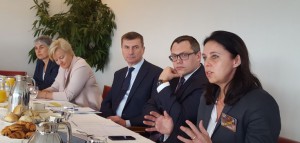EBU calls for cross-border access to content
 EU decision makers should give citizens “the keys to enjoy more TV and radio programmes” from across Europe, according to the EBU and BEUC.
EU decision makers should give citizens “the keys to enjoy more TV and radio programmes” from across Europe, according to the EBU and BEUC.
At an event yesterday at the European Parliament in Strasbourg, the European Broadcasting Union (EBU) and European Consumer Organisation (BEUC) supported the adoption of draft copyright licensing rules relating to broadcasters’ online transmissions and retransmissions.
The draft rules would provide broadcasters and rightholders with new licensing tools to offer more TV programmes and services online and across borders.
At the same time, they would not alter the principles of contractual freedom and territorial licensing, which the EBU said are of “utmost importance” for Europe’s audiovisual sector.
“Our proposal will make it significantly easier for broadcasters to offer online programmes across borders, but also incentivise the broadcasters to use this possibility,” said European Commission vice-president, Andrus Ansip.
“My goal is to double the content available to consumers so that everyone across Europe can get the most out of our rich cultural diversity within the Digital Single Market.”
EBU director general, Ingrid Deltenre, described the absence of adapted copyright licensing rules in a digital age as “an anachronism”. She said: “Subject to some improvements, the new rules can give more access to TV and radio programmes online in the EU Digital Single Market and they will not weaken rightsholders’ and broadcasters’ contractual freedom.”
BEUC deputy director general, Ursula Pachl, added: “Current copyright rules hamper consumers’ ability to enjoy the full breadth of Europe’s cultural diversity.
“When recent studies show that 82% of Europeans want to watch and listen content through legal offers instead of trying to circumvent access barriers, EU legislators should vigorously take the path of more choice rather than upholding artificial borders.”
The draft rules were first put forward by the European Commission in September 2016 and are inspired by the 1993 Cable and Satellite Directive.



